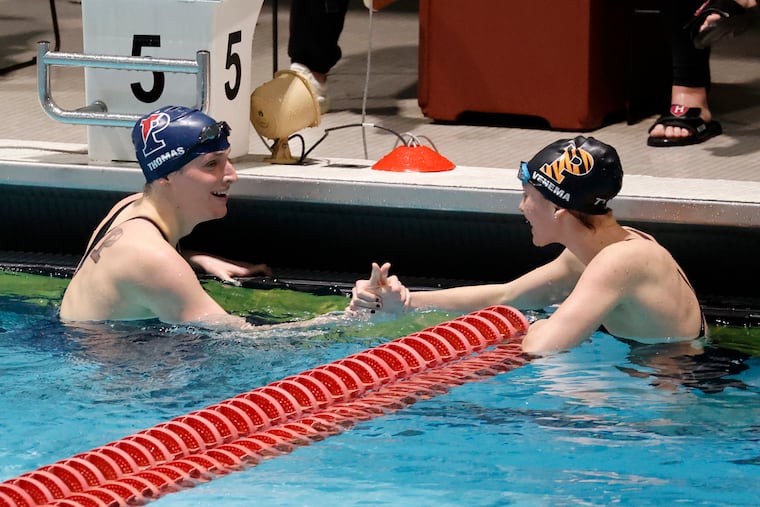When we talk about Penn swimmer Lia Thomas, we’re listening to the wrong voices | Opinion
Michael Phelps, Caitlyn Jenner, and Jordan Peterson aren't experts on transgender athletes. Here are five people we should be listening to instead.

Lia Thomas, a 22-year-old senior on the Penn women’s swim team, holds the fastest swim times in the country among NCAA women in two freestyle events. She also happens to be a trans woman. Last weekend at the Ivy League Championships, Thomas won three titles. Her success has put her in the center of a national debate on trans women’s right to play sports.
As a nonbinary trans person myself, and a former swimmer, I can’t help but notice that only a few voices are weighing in on this topic. Few have anything original to say.
Olympic champion Michael Phelps said on CNN that the issue is “very complicated.” Caitlyn Jenner, a trans woman and Olympic gold decathlon champion, said on Fox News that “we need to protect women’s sports” and that Thomas’ participation “is not good for the trans community.” Jordan Peterson, a former professor of psychology, likened trans lives to “satanic ritual abuse” and a sign of the end of civilization in a conversation with former MMA fighter Joe Rogan on his podcast.
Michael Phelps, Caitlyn Jenner, and Jordan Peterson are being asked to weigh in on an issue that they haven’t worked on in any substantial way. Phelps hasn’t committed his life to trans activism and civil rights. When I listen to Jenner, I can’t help but feel that even though she is trans, she is isolated. She doesn’t have much other than the spotlight, and under that glare, she repeats what other people say. Peterson has never published peer-reviewed work on gender, bodies, or anything of relevance to the topic of trans women in sports.
The exclusion of substantive voices — and a lack of understanding about the topic of trans life — has consequences. This month, state legislatures in Kentucky, Indiana, and Iowa passed bills that limit trans women and girls from participating in sports. Alabama lawmakers also passed a bill banning transgender students from using school bathrooms and locker rooms that align with their gender identity.
Many people don’t realize that the real impact of these anti-trans bills will be a spike in depression and a risk of suicide for trans kids fueled by rejection, marginalization, and hate. We owe it to trans kids to do better.
My recommendation is that those having conversations about trans people — whether at home, in the news, on the deck of a swimming pool, or in a state legislature — consult experts with a known track record in what they are talking about. There are many fantastic voices to choose from.
Veronica Ivy has done a stellar job addressing inexpert arguments about unfair advantages in sports. Historian Julian Gill-Peterson’s 2018 book Histories of the Transgender Child addresses the medicalization and racialization of children’s bodies. Anne Fausto-Sterling has a long record of publishing peer-reviewed papers on the topics of sex, gender, development, and biology. Reubs Walsh has committed her academic career to investigating the links between neurodiversity, transness, and mental health. Sari van Anders researches sex and gender as it relates to the study of hormones and culture. Their work is all too often ignored or overlooked.
We need to invite real experts into any conversation or policymaking discussion that impacts trans people.
The true conversation has nothing to do with testosterone or science, and everything to do with fear — specifically, people’s fear about their own gender identity and fear of people who don’t have a gender identity that’s easy to read.
Maybe, someday, we’ll all be able to swim together.
Mal Pool is a trans nonbinary founder of a collective that mediates nonviolent conflict and discrimination at music events in Berlin and a former swimmer from Indiana.
If you or someone you know is in crisis, call the National Suicide Prevention Lifeline at 1-800-273-8255, The Trevor Project at 866-488-7386, Trans Lifeline at 877-565-8860, or text TALK to the Crisis Text Line at 741741.